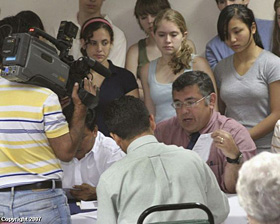 |
 |
 |
 Editorials | Issues | April 2007 Editorials | Issues | April 2007  
Faith-Based Groups Explore Migration
 Thelma Guerrero - Statesman Journal Thelma Guerrero - Statesman Journal


| | Francisco López of Salem (right) discusses migration issues with members of the board of directors of the Association of Rural Communities for the Development of El Salvador during a fact-finding trip to the Central American nation last month. Student delegates from Seattle, Wash., look on. This news conference took place in the capital city of San Salvador. (Statesman Journal) |
Free-trade agreements, poverty, environmental degradation and lack of jobs are among the reasons people from El Salvador migrate to the United States, said members of a delegation of religious leaders and people of faith from Salem who traveled to the region.

"The major export in El Salvador are immigrants," said Francisco López, a member of Queen of Peace Catholic Church and the director of Integrated Services Network, part of Catholic Community Services in Salem.

López and seven other individuals from the Salem-Keizer area were part of a 42-member delegation from four states that traveled to the Central American nat-ion last month to learn about the root causes of migration, both legal and illegal, to the United States.

The groups also had planned to visit Oaxaca, Mexico, to learn why people migrate from that nation but postponed that trip until next year.

Immigration has been, and continues to be, a volatile topic in Salem and across the nation.

During their one-week stay in El Salvador, the delegates visited with faith communities, government officials, school officials, local advocacy partners, and people in rural communities.

The Rev. Gail McDougle, senior pastor of First Congregational United Church of Christ in Salem, said free-trade agreements with the United States are major factors behind 700 Salvadorans leaving their nation each day.

"Agreements create some jobs but they don't pay a living wage, so people leave," McDougle said. "In essence, the economy (of El Salvador) depends on migration to the United States."

That dependency is tied to remittances sent to families in El Salvador by families living in the United States. The remittances equal El Salvador's entire federal budget of $3 billion, McDougle said.

"So there's no real motivation on the part of the government to change that because here's this huge cash cow feeding it," she said, "so it does nothing to stop migration."

In August 2005, El Salvador and four other Central-American nations entered into the Central American Free Trade Agreement, or CAFTA, with the United States. In March 2006, El Salvador became the first of those countries to implement the agreement.

The treaty has made it easier for large companies from the United States to operate in El Salvador.

However, the delegates learned from farmers and peasants who work the fields that those companies have done more harm than good to the agricultural sector of that nation, said Sarah Harkness, the coordinator of the United Methodist Hispanic/Latino Ministry Training Institute in Salem.

Many of those corporations do not comply with environmental laws, resulting in polluted rivers and the kill-off of fish and other species, she added.

"I followed people's shocked stares to a stream running out of (a paper processing plant) into the Rio Sucio," said Harkness, adding that the river is a major source of drinking water for many Salvadorans.

The poisoned rivers also make it difficult to irrigate crops, causing an increase in demand for imports of vegetables such as corn, beans and other products from the United States, McDougle said.

"Their sugar cane industry is also experiencing a severe decline because they can't complete with the United States," she said.

Just as devastating is the fact that many villages have no men older than the age of 15 because most of migrated to the United States, Harkness said.

"Immigration is impacting family unity," she said. "Usually when parents leave, the children stay with relatives or aunts. They often think that their parents abandoned them."

"The money sent back won't change that sense of abandonment."

While in El Salvador, the delegates met with Donny Burridge, the director of the SHARE Foundation in El Salvador, part of an international nonprofit organization that works with poor communities.

From Burridge, the group learned about the government's plan to build a beltway to help ease congestion on the Plan Pueblo Panama, a major expressway that carries imports and exports between the United States, Mexico and Central America.

Its construction will displace about 70,000 Salvadorans who live in the region, López said.

"These people have no place to go," he said. "They'll likely migrate to the United States."

tguerrero@StatesmanJournal.com or (503) 399-6815 | 
 | |
 |



